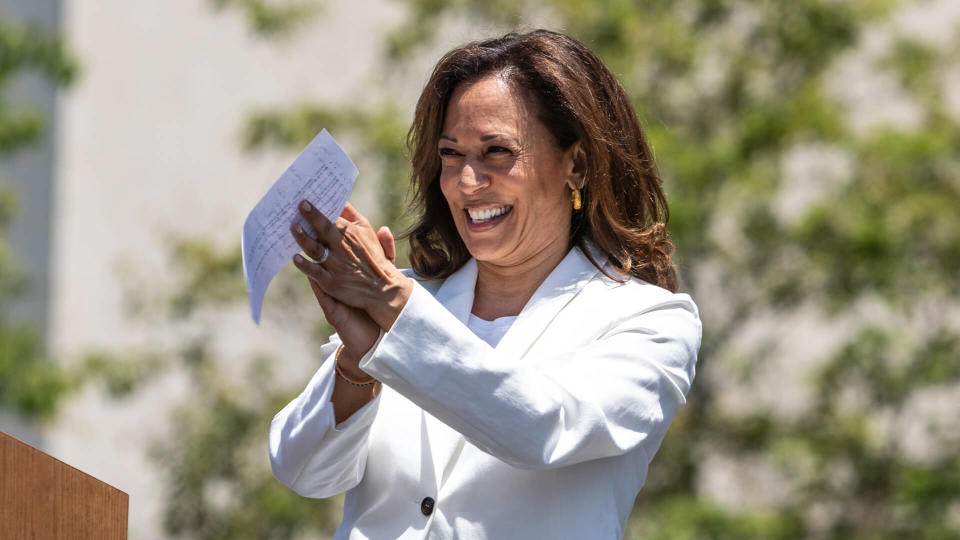8 Ways That a Kamala Harris Presidency Could Impact the Upper-Middle Class

The 2024 presidential election will be here before you know it and many Americans are wondering how a potential Kamala Harris presidency might affect their financial future. For the upper-middle class, a change in administration could bring some shifts in tax policy and economic outlook.
GOBankingRate spoke with experts to understand the potential impacts and strategies to consider. Here are eight ways that a Harris presidency could impact the upper-middle class.
In contrast, here are ways that a Harris presidency could impact the lower-middle class.
Find Out: How Much Is Vice President Kamala Harris Worth?
Discover Next: 6 Subtly Genius Things All Wealthy People Do With Their Money
Wealthy people know the best money secrets. Learn how to copy them.
Expiration of Tax Cuts and Jobs Act Provisions
One of the most significant changes on the horizon is the scheduled expiration (at the end of 2025) of several provisions from the Tax Cuts and Jobs Act of 2017. Joseph Carpenito, financial advisor at Materetsky Financial Group said, “For individuals, some of the most significant tax cuts are set to expire at the end of 2025, returning federal income tax rates to 10%, 15%, 25%, 28%, 33%, 35% and 39.6%.”
This change could hit the upper-middle class particularly hard, because they might find themselves in higher tax brackets. Instead, Carpenito said “If you have a significant portion of your retirement assets in a pre-tax IRA, it may be beneficial to fill up your bracket with Roth conversions if you anticipate higher taxes under a [Harris] victory.”
Explore More: Trump Wants To Eliminate Income Taxes: Here’s What That Would Mean for the Economy and Your Wallet
Changes to Standard Deduction
The generous standard deduction introduced by the 2017 tax law may also be on the chopping block. “Higher-income earners might want to consider front-loading their income in these more favorable tax years before these laws sunset,” Carpenito said.
This could mean the upper-middle class might want to accelerate income or defer deductions while the current tax structure is still in place.
Potential Expansion of Earned Income Tax Credit
Not all changes may be negative for the upper-middle class. David Damore, Ph.D., professor of political science at UNLV, points out a potential bright spot. “One area where there may be bipartisan support is expanding eligibility for the earned income tax credit (currently capped at around $64k),” he said.
This expansion could provide some relief for families at the lower end of the upper-middle class spectrum.
Increased Tax Enforcement
“The 2022 IRA appropriated a lot of money to support tax enforcement,” Damore said. “My sense is the Democrats will want to continue down the road, while the GOP will work to strip funding from the IRS.”
For the upper-middle class, this could mean a higher likelihood of audits and a need for meticulous record-keeping.
Changes to Estate Tax Exemption
Carpenito warned of potential changes to estate tax limits. “The current estate tax limit of $13.61 million for individuals and $27.22 million for married couples may be cut nearly in half,” he said. “If you think this will happen under a [Harris] presidency, consider estate planning strategies to minimize your taxable estate if you are an older individual in retirement.”
This could significantly impact wealth transfer plans for upper-middle class families.
Modifications to Child Tax Credit
Families in the upper-middle class should be prepared for potential changes to the Child Tax Credit. Carpenito said, “If you have children, be aware that the current boosted child tax credit of $2,000, with a refundable portion of $1,400, may revert back to 2017 levels without a change from Congress.”
Potential Changes to Tipped Income Taxation
Damore brought up an interesting point when he said: “A wild card and one that is certainly salient in Nevada changing how tipped income is treated. If tipped income is not taxed, then that would require an offset somewhere else in the tax code to generate the lost revenue.”
While this might not directly affect most of the upper-middle class, it could have ripple effects throughout the tax code.
Continued Focus on Clean Energy Initiatives
A Harris presidency would most likely continue the push for clean energy, which could create both opportunities and challenges for the upper-middle class.
Keep an eye on extended tax credits for electric vehicles and home energy improvements, which would benefit members of the upper-middle class who have invested in this technology.
Use Your Resources
All that said, the key for the upper-middle class is stay informed and educated. You might consider consulting with financial advisors and tax professionals to go over your portfolios and prepare for the future.
Remember, as with any major political shift, there will likely be both challenges and opportunities. The key is to be prepared and proactive in your financial planning.
Editor’s note on election coverage: GOBankingRates is nonpartisan and strives to cover all aspects of the economy objectively and present balanced reports on politically focused finance stories. You can find more coverage of this topic on GOBankingRates.com.
More From GOBankingRates
This article originally appeared on GOBankingRates.com: 8 Ways That a Kamala Harris Presidency Could Impact the Upper-Middle Class